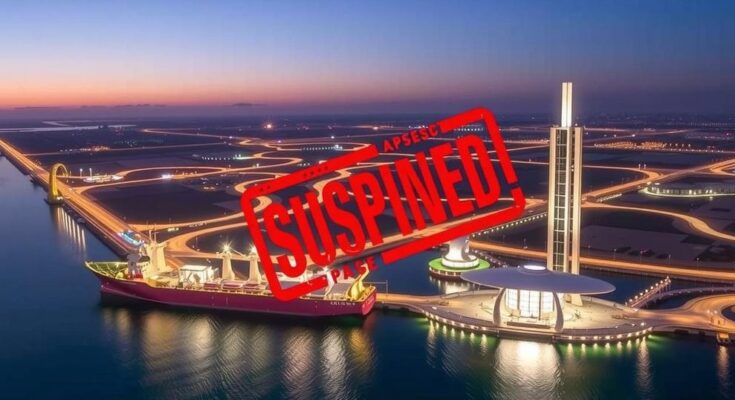Qatar’s Foreign Ministry rejected speculation about reviving a pipeline project to transport natural gas to Europe via Syria and Turkey, branding it as media speculation. Following political changes in Syria, the notion of the project has resurfaced, but experts cite numerous hurdles, emphasizing Qatar’s focus on expanding LNG exports instead of pursuing contested pipeline initiatives.
The Qatari Foreign Ministry has firmly dismissed rumors concerning the potential revival of a pipeline project designed to transport natural gas from Qatar to Europe via Syria and Turkey. Majed bin Mohammed al-Ansari, the ministry’s spokesperson, described these claims as mere speculation when responding to inquiries from the Russian state-owned news agency TASS. Following the recent political developments in Syria, discussions about reinitiating the Qatar-Turkey Natural Gas Pipeline, initially proposed in 2009 and halted after Syrian President Bashar al-Assad prioritized Russia’s gas supply, have reemerged. Turkey’s Energy Minister Alparslan Bayraktar suggested that the revival might be feasible only if Syria attains territorial stability.
This ambitious pipeline project, estimated at $10 billion, was intended to facilitate the movement of gas sourced from Qatar’s South Pars/North Dome field, traversing Saudi Arabia, Jordan, and Syria, ultimately reaching Europe. However, al-Ansari indicated that Qatar’s current efforts focus on humanitarian and infrastructural support for the Syrian populace rather than on gas export initiatives. He emphasized Qatar’s commitment to aiding the Syrian people while refraining from making statements regarding the potential of a gas supply chain.
Al-Ansari’s remarks corroborate the skepticism voiced by Turkish energy experts regarding the practicality of the pipeline project. Oil and gas analyst Sohbet Karbuz cited economic, technical, and political hurdles as critical barriers to its realization, noting that Qatar’s ongoing expansion of liquefied natural gas (LNG) capabilities renders the pipeline redundant. As Qatar anticipates an 85 percent increase in its LNG output capacity—from 77 million to 142 million metric tons by 2030—it faces challenges in securing markets for its increased production, complicating any endeavors toward a competing pipeline project.
Additionally, the stringent energy regulations in Europe, coupled with a lack of long-term purchasing agreements, further undermine the viability of the pipeline initiative. Karbuz advocated for Qatar to concentrate on maximizing its LNG exports, which would offer greater efficiency and flexibility compared to constructing a pipeline through geopolitically sensitive areas. Fellow energy analyst Ali Arif Aktürk and London Energy Club Chairman Mehmet Öğütçü echoed these sentiments, asserting that Qatar’s current LNG strategies are more advantageous than pursuing a pipeline in contested territories.
The overarching strategic context presents further challenges, as Europe’s demand for natural gas is gradually shifting toward renewable energy options, indicating a demand-supply imbalance that any proposed pipeline must contend with. Regional gas solutions from the eastern Mediterranean may provide more immediate benefits for European markets than a long-term pipeline endeavor.
The discussions surrounding the potential resurrection of the Qatar-Turkey Natural Gas Pipeline, originally proposed in 2009, have intensified following the recent political shifts in Syria after the fall of the Ba’ath regime. The pipeline was initially rejected by Syria, which preferred to remain aligned with Russia, Europe’s primary gas supplier. Despite the speculation about reviving this major project, various analysts have expressed doubts concerning its feasibility amidst the current energy landscape, particularly in light of Qatar’s plans to significantly boost its LNG export capacity.
In conclusion, while there has been renewed speculation regarding the Qatar-Turkey Natural Gas Pipeline, the Qatari Foreign Ministry has reaffirmed its dismissal of these discussions as mere speculation. Analysts express strong skepticism about the practicalities of such a project due to a combination of economic, technical, and political challenges. Rather than pursuing the pipeline, it may be more advantageous for Qatar to focus on maximizing its existing LNG exporting capabilities to meet international market demands.
Original Source: www.turkishminute.com




